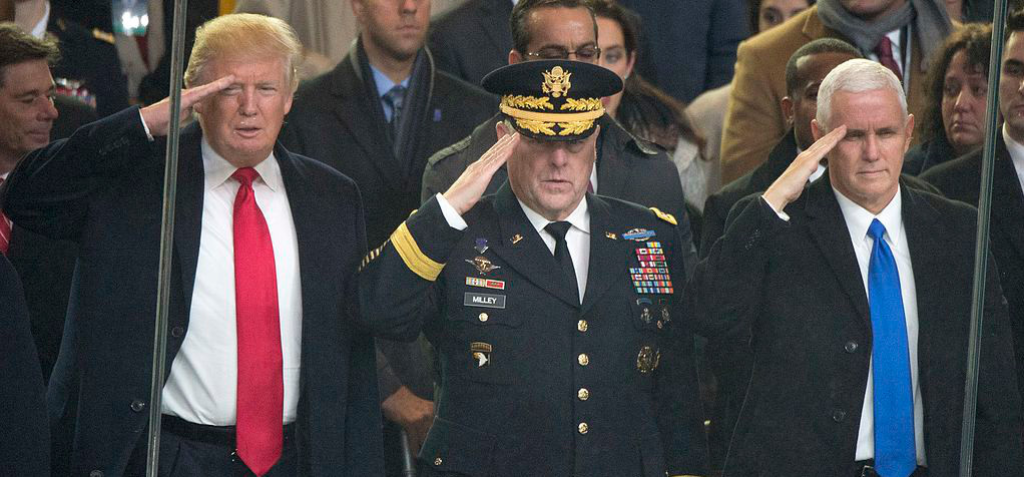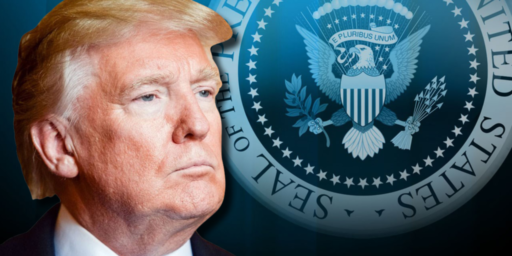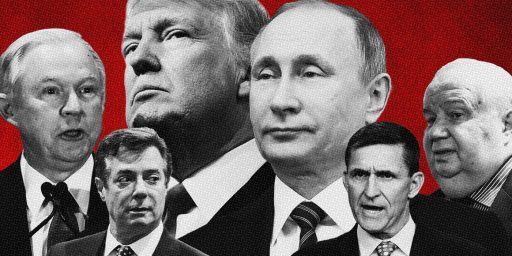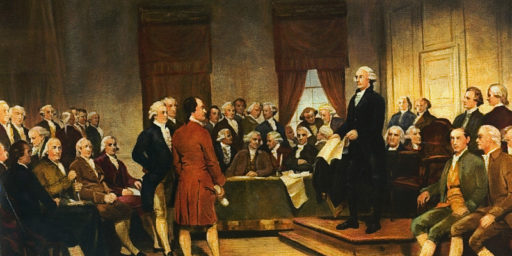Trump Reportedly Will Pardon American Servicemen Convicted Of War Crimes
President Trump is reportedly planning to pardon several American servicemen convicted of war crimes, an action that would be an insult to everyone who has ever worn an American uniform.

Over the weekend, The New York Times reported that President Trump is reportedly planning to pardon several American soldiers who were convicted of war crimes committed during their service in Afghanistan and Iraq:
President Trump has indicated that he is considering pardons for several American military members accused or convicted of war crimes, including high-profile cases of murder, attempted murder and desecration of a corpse, according to two United States officials.
The officials said that the Trump administration had made expedited requests this week for paperwork needed to pardon the troops on or around Memorial Day.
One request is for Special Operations Chief Edward Gallagher of the Navy SEALs, who is scheduled to stand trial in the coming weeks on charges of shooting unarmed civilians and killing an enemy captive with a knife while deployed in Iraq.
The others are believed to include the case of a former Blackwater security contractor recently found guilty in the deadly 2007 shooting of dozens of unarmed Iraqis; the case of Maj. Mathew L. Golsteyn, the Army Green Beret accused of killing an unarmed Afghan in 2010; and the case of a group of Marine Corps snipers charged with urinating on the corpses of dead Taliban fighters.
The officials, who spoke on condition of anonymity because they were not authorized to speak publicly, said they had not seen a complete list, and did not know if other service members were included in the request for pardon paperwork.
The White House sent requests on Friday to the Justice Department’s Office of the Pardon Attorney, which alerted the military branches, according to one senior military official. Pardon files include background information and details on criminal charges, and in many cases include letters describing how the person in question has made amends.
The official said while assembling pardon files typically takes months, the Justice Department stressed that all files would have to be complete before Memorial Day weekend, because the President planned to pardon the men then. A second United States official confirmed the request concerning Chief Gallagher.
The military branches referred questions to the Justice Department, which declined to comment on the matter.
Mr. Trump has often bypassed traditional channels in granting pardons and wielded his power freely, sometimes in politically charged cases that resonate with him personally, such as the conviction of the former Arizona sheriff Joe Arpaio. Earlier this month, the president pardoned former Army First Lt. Michael Behenna, who had been convicted of killing an Iraqi during an interrogation in 2008.
(…)
Long ago, presidents wielded clemency power directly, Ms. Love said, but that changed at the end of the Civil War when President Lincoln delegated review of clemency requests to his attorney general. Since then, cases have generally been vetted by Justice Department lawyers before being sent to the president.
President Trump has upended that practice, often issuing pardons with little or no notice to the Justice Department, she said, adding that the fact the department is requesting files on men like Chief Gallagher at all suggests that Attorney General William P. Barr is trying to re-exert some authority over the process.
Process aside, she said that pardoning the men would be an abrupt departure from the past.
“Presidents use pardons to send messages. They recognize when a process wasn’t just or when punishments were too extreme, like for some nonviolent drug cases,” she said. “If this president is planning to pardon a bunch of people charged with war crimes, he will use the pardon power to send a far darker message.”
Shay Khatriti argues that such pardons would harm both the military and America’s national interests:
The former American servicemen convicted of war crimes were found to have disobeyed legal orders given by their commanders. Trump’s pardon is a rebuke to those legal orders. It places the commander in chief in the position of telling that soldiers lower in the chain of command that maybe they can do whatever they like. For the vast majority of our soldiers, sailors, airnmen, marines, and guardsman—who serve with honor and integrity—Trump’s pardons undermines and insults their righteous service. And in the long run, this can only sow distrust of civilian leadership within our military.
Then there is society at large. In our representative democracy, it is incredibly difficult to win a war without the support of the American public. Again: War is a political act. So within the context of liberal democracy, war can be viewed as an expression of public will. If the public does not support a war, then the war cannot be prosecuted successfully.
When you understand war in that way, you see why public support for the military itself is a key part of our national interest: If the public distrusts or disrespects the nation’s armed forces, then it will be harder to sustain the will for military operations in the future. A country which lacks the will to fight is weak. And weakness is a provocation.
Having the commander in chief condone war crimes will almost certainly lead to diminishing respect for the military by the public at large. And in the long run, this becomes dangerous.
Which brings us to another problem: Another element of the trinity is the relationships of the military with the governments and the societies that host it abroad. The easiest phase of a war for the United States military is overthrowing a hostile government, as seen in Iraq and Afghanistan. The hard part is providing security and postwar stabilization. The Surge in Iraq is a good example of how a military that provides protection and comfort for native civilians and is seen as a moral force will be welcomed. And this welcoming attitude makes it easier to obtain our national objectives. A military that is seen as immoral will get no such welcome. If you want a stark example of this, consider the difference between how the Americans and the Soviets were greeted after liberating Europeans from the Nazis.
And then there is the question of alliances.
Whatever one thinks about the military expenditures of NATO member nations, the truth is that since the end of World War II, America’s allies have been assisting us in our wars, not the other way around. There is no reason to believe that this practice will not continue far into the future. And it is easier to secure such help if the civilian populations of allied countries respect the honor and integrity of the U.S. military. If the populations of, say, Great Britain, or France, come to view America’s military as an organization which does not heed the laws of war, it will make it harder for their leadership and people to support us, even if it is in their national interest.
Max Boot voices similar objections in The Washington Post:
In 2016, President Trump ran on a war crimes platform. He vowed: “I would bring back waterboarding. And I would bring back a hell of a lot worse than waterboarding.” (Japanese soldiers were convicted after World War II in a war crimes tribunal for waterboarding American and Allied prisoners.) He also promised to “take out” the families of terrorists and approvingly recounted a false story about Gen. John J. Pershing executing 49 Muslim rebels in the Philippines, employing bullets dipped in pig fat.
These blood-curdling threats from an armchair general who skipped out on the Vietnam War were very much at odds with the ethos of Trump’s first secretary of defense, retired Marine Gen. Jim Mattis, who had exhorted his Marines at the start of the Iraq War: “Engage your brain before you engage your weapon. … Carry out your mission and keep your honor clean.” Mattis dissuaded Trump from issuing an unlawful order to torture terrorists, Trump said, by telling him: “I’ve always found, give me a pack of cigarettes and a couple of beers and I do better with that than I do with torture.”
But this turned out to be only a temporary reprieve. Just as no amount of evidence can convince Trump that other countries don’t pay tariffs (American consumers do), so no amount of evidence can convince him that brutalizing prisoners and civilians is not a good idea. He said in 2017 that he was still “absolutely” an advocate of waterboarding but was deferring to Mattis.
(…)
Having no honor of his own, Trump doesn’t understand the importance of Mattis’s injunction to keep one’s honor clean — to maintain the thin line that separates professional, disciplined soldiers from the Mongol hordes of the 13th century or the German SS. Trump is telling the troops: Don’t listen to your superiors. Ignore the rules of engagement. Feel free to commit atrocities in the expectation of a presidential pardon.
There is no more corrosive message a commander in chief could send, which is why so many veterans who served honorably are so appalled by what Trump is doing. If Congress had any honor of its own, Trump’s incitement of unlawful behavior by the troops under his command would be yet another count in the articles of impeachment against him.
All of these objections are well-founded, and any other President would likely cite them as reasons to deny pardons under these conditions. Pardoning men who have been convicted of war crimes while wearing an American uniform sends precisely the wrong message to the world. To our adversaries, it sends the message that our rhetoric about a commitment to the Rule of Law and justice are mere words without any meaning. It sends the same message to the general population around the world who may have once looked to the United States as a beacon of human rights and justice in a grim world where the violation of rights and the commission of what amount to war crimes is a common occurrence. Pardoning men who have been convicted of war crimes sends the message that these are mere words, and makes it far more difficult for the United States to criticize any other nation that lets its military get away with similar actions.
Khatiri’s final points, regarding the impact that a decision like this might have on nations currently hosting American troops, or that might be asked to do so in the future, and on our alliances generally is perhaps the most important. There have already been situations over the years regarding the treatment of Americans who commit crimes in allied nations hosting American troops, most notably in Japan where a case involving a U.S. Navy sailor and two Marines stationed on Okinawa where charged with raping a 12-year-old female civilian. The incident itself led to widespread protests even though the servicemen were tried and convicted in a Japanese court pursuant to the agreement between the U.S. and Japan. While an incident such as that would not be within the power of a U.S. President to pardon, pardoning these war criminals would potentially send a message to our allies that wrongdoing by American forces may be seen as excusable by the civilians in Washington in charge of the military.
Of course, it’s clear that these types of concerns don’t matter to President Trump. He has abandoned even the pretense of a foreign policy based on the promotion of human right and has looked the other way as allegations have been leveled against nations such as Russia, Egypt, Saudi Arabia, China, North Korea, and The Philippines. Additionally, the fact that pardons such as this could damage our alliances doesn’t matter to him either given the fact that he has done everything he can to drive a wedge between America and our closest allies, as I have documented here, here, and here among other places.
From Trump’s point of view, it’s likely that he sees the possibility of pardoning these servicemen as yet another way to pander to the hyper patriotism of his base, a base that likely doesn’t care that these men committed serious crimes while wearing the uniform of the United States. This is perhaps best revealed by the fact that he is apparently planning to take this action to coincide with the upcoming Memorial Day weekend. In reality, of course, what he proposes to do sullies the reputation not only of the men and women who currently serve in America’s military but those who gave up their lives for their nation in wars dating back to the American Revolution. These pardons would be a slap in their face from a man who didn’t even have the courage to serve when his fellow Americans were overseas dying in war.






Sometimes lost in the everyday lying and obstructing and colluding, is that underneath it all, Trump is a truly pathetic human.
It’s not that they don’t care – it’s that they don’t consider them to be crimes in the first places. If they acknowledge any wrongdoing at all, it’s justified by some nebulous BS dripping with racism and horrifying lack of concern for humanity. These are people who don’t think Americans can commit war crimes because you can only that to other people and American are the only ones that count. They’re perfectly OK with dozens of innocents being slaughtered simply because they’re “Other”.
Trump’s pandering to people who think the other servicemen and women who were brave enough to report these monsters are liars. Trump’s pandering to a crowd that thinks holding our military accountable is a travesty and that monsters among their ranks don’t exist. For pure political points with a small subset of nuts, he’d disgrace everyone who held to the rule of law and kept their humanity by letting this criminals free.
He’d let serial killers walk the streets of America with his blessing. Think about that, America – who he’s sending back to your neighborhood because it’s not like that kind of psychopathy just stops.
This is awful, and it makes us less safe. I don’t know who brought this to his attention, but this is not remotely a good signal to send to our armed forces.
Some conservatives are super psyched about these pardons:
Will The President Set Right a 10-Year-Old Injustice?
This is not just Trump. The Republicans in congress will conduct no oversight of this, brook no censure. We have an amoral idiot as a president, but I am more worried that the entire congressional Republican Party with one single exception (Amash) has shown that there is literally nothing they will not countenance if taking any action would endanger their seats or their billionaire hobbyist donors. The Republican Party has no moral center. They are chaos and anarchy in dark suits and red ties.
I hope that the result of this is the US military getting kicked out of quite a few locations around the world.
You have to wonder about the psychology of people who thing “great” means “banana republic standards.”
China and Russia must find this pure gold.
@MarkedMan: It’s not just that — as I have written in this very blog, Duncan Hunter Jr. is the leading cheerleader for the Gallagher pardon.
REALLY important to note how distinguishable the case of Matt Golestyn is from these other cases. In Behenna, Trump reversed a jury verdict that considered and rejected his claims of self-defense. In Lorance, Trump will have reversed a jury verdict. In Gallagher, he will have interered with a case that hasn’t even gotten to trial yet. But in the Golestyn case, his pardon will correct a manifest injustice — the Army 3 years ago considered charging Matt and decided the evidence was too weak to sustain a court-martial. As I have written elsewhere in this blog, the Army has allowed a narrative to persist that Matt killed a detainee. That is categorically untrue. Matt killed a bombmaker on the Afghan battlefield returning to his base of operations to conduct hostile acts against coalition forces. And the Army’s lead investigator was convicted at a court-martial HIMSELF for honesty offenses about two weeks ago — the E7 investigator was found guilty of wearing a Purple Heart he didn’t rate and making false official statements. The Golestyn case is a dog, and a pardon for Matt would be a just outcome. The Army had their chance and punted. Why do they get a second bite at the apple?
If there were any implication that Trump was looking at these cases individually, Butch, it would be worth digging into the relative merits of any of them. It his apparently indiscriminate granting of pardons that reveals not his disagreement with certain outcomes, but his contempt for the the underlying rules.
Doesn’t a blanket pardon of convicted criminals totally besmirch any pretense of the rule of law? I know that our justice system has imperfections. I know that a presidential pardon can iron out some of these imperfections at the obvious risk of establishing an arbitrary standard based on one guy’s thinking. However, a blanket pardon means that our system of jurisprudence is in the garbage. Only the Trump decides.
@Butch Bracknell: Assuming for the sake of argument that Golestyn is innocent, then while this keeps him from jail, it will destroy his reputation. He will forever be seen as one of the war criminals Trump pardoned. Fifty years from now that’s how his obituary will read.
Does the pardoning of War Criminals lead to any criminal liability in the World Court?
Will Mr. Trump have to be careful where he goes in the future, post-presidency?
I suspect the answer is no, but I really want it to be yes. Morally, he is an accessory after the fact.
(You could make a case that Jesus, with his “forgive everyone” stuff would also be an accessory after the fact, if he had the power of legal pardons, but his forgiveness is so universal that he isn’t making a judgement… Trump is embracing the crimes, and saying that they aren’t crimes worth prosecuting)
@Gustopher:
If you can get Jesus into the Hague for the trial in the first place, you’ve earned the right to make whatever case you want. You’ve clearly worked miracles already 🙂